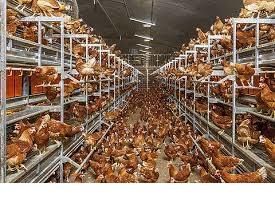 U.S. Representatives Veronica Escobar (D-TX) and Nancy Mace (R-SC) have introduced H.R. 7004, the Pigs in Gestation Stalls (PIGS) Act, that would establish a minimum-space requirement for all U.S. sows. It is estimated that there are five million sows held for breeding in the U.S., with perhaps a third of them already out of conventional gestation crates into group housing.
U.S. Representatives Veronica Escobar (D-TX) and Nancy Mace (R-SC) have introduced H.R. 7004, the Pigs in Gestation Stalls (PIGS) Act, that would establish a minimum-space requirement for all U.S. sows. It is estimated that there are five million sows held for breeding in the U.S., with perhaps a third of them already out of conventional gestation crates into group housing.
Ten states have passed legislation banning gestation crates that confine sows to enclosures approximately 7 feet by 3 feet that effectively prevent these breeding animals from rotational movement. California led the way with Proposition #2 in 2008 subsequently clarified and reinforced by Proposition #12 in 2018. Similar legislation has been passed in Florida, Arizona and New-England states. Sales bans for pork from operations relying on gestation crates take effect in California following publication of standards and in Massachusetts, effective 2022.These states have nearly 50 million consumers. In addition, sixty major restaurant chains and retailers have committed to only sourcing pork from farms using group housing for sows.
 The concept of a federal standard for sows revisits the previously abandoned "Egg Bill". Prior to passage of Proposition #12, the UEP and HSUS agreed that enriched colony modules, floor systems or aviaries would be an acceptable alternative to conventional cages allowing hens 140 square inches in colonies and 1 square foot of useable floor space in alternative systems. The federal standard that would have been incorporated in the "Egg Bill" foundered for a number of reasons including vigorous opposition and lobbying from pork producers but it may be worthy of reconsideration. An interesting provision of the PIGS Act is that funds would be applied from the pork check-off to compensate farmers for expenditure involved in transition from gestation crates to group housing. This would be unfair to the producers that have already committed to conversion and have invested in a more humane and consumer-acceptable system.
The concept of a federal standard for sows revisits the previously abandoned "Egg Bill". Prior to passage of Proposition #12, the UEP and HSUS agreed that enriched colony modules, floor systems or aviaries would be an acceptable alternative to conventional cages allowing hens 140 square inches in colonies and 1 square foot of useable floor space in alternative systems. The federal standard that would have been incorporated in the "Egg Bill" foundered for a number of reasons including vigorous opposition and lobbying from pork producers but it may be worthy of reconsideration. An interesting provision of the PIGS Act is that funds would be applied from the pork check-off to compensate farmers for expenditure involved in transition from gestation crates to group housing. This would be unfair to the producers that have already committed to conversion and have invested in a more humane and consumer-acceptable system.
The blizzard of litigation initiated by the National Pork Producers Council (NPPC) and supported by other some other agricultural organizations in an attempt to limit Proposition #12 to California represents a waste of both time and money. The numerous petitions that have been rejected at federal district level and subsequent appeals to higher courts represent a disservice to the hog industry and ultimately for the producers who are determined to retain an archaic and patently cruel system of confinement. Regrettably for the members of the NPPC the train has left the station. Producers using gestation crates will have progressively greater difficulty in marketing their products.
 The U.S. egg industry recognized the inevitability of replacing conventional cages a decade ago and invested in alternative housing with one third of the national flock transferred to aviaries and floor systems at this time. The total cost of conversion is estimated to be northward of $10 billion and rising, taking into account the necessary conversion of pullet housing and inevitable restructuring. Existing obsolete housing that is unsuitable for conversion or located on small farms requiring off-line processing will have to be replaced by new in-line aviary complexes requiring packing plants and feed mills.
The U.S. egg industry recognized the inevitability of replacing conventional cages a decade ago and invested in alternative housing with one third of the national flock transferred to aviaries and floor systems at this time. The total cost of conversion is estimated to be northward of $10 billion and rising, taking into account the necessary conversion of pullet housing and inevitable restructuring. Existing obsolete housing that is unsuitable for conversion or located on small farms requiring off-line processing will have to be replaced by new in-line aviary complexes requiring packing plants and feed mills.
Revisiting the Egg Bill to allow enriched colony modules, aviaries, floor housing and suitable alternatives under a federal standard would provide a level playing field for the entire U.S. egg industry. Extending the period for full replacement of conventional cages to beyond 2025 would facilitate planning and the acquisition of capital expended on conversion at a predetermined rate in accordance with a national program.